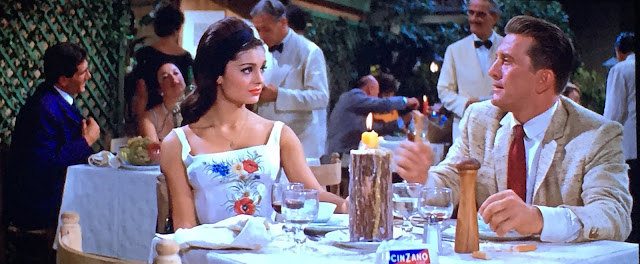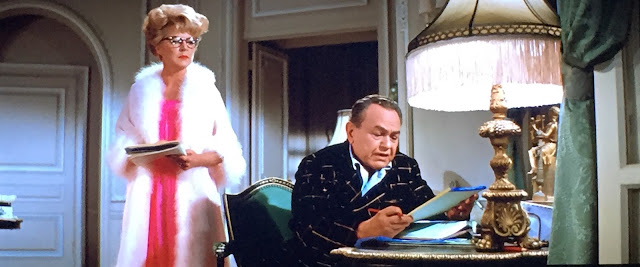An entry into the genre of Southern family dramas like Giant (1956), Written on the Wind (1956), Cat on a Hot Tin Roof (1958) and Splendor in the Grass (1961), director Vincente Minnelli's Home from the Hill (1960) has all the makings of a sweeping epic. You've got the dysfunction family with a long suffering matriarch, disturbed offspring, a scandal or two swept under the rug, and a tough as nails patriarch who has staked his claim as the unofficial leader of the small town community. That patriarch is Captain Wade Hunnicutt (Robert Mitchum), the manliest man who ever did man.
The wealthiest landowner in a rural Texas town, Wade has a commanding presence. When he isn't taking care of business, he can be found out with his cohorts and hound dogs hunting for ducks. Or you'll find him drunk and cavorting with the local prostitute Opal (Constance Ford) or some poor guy's wife. The local men admire him or hate him. Wade's 17 year old son Theron (George Hamilton) is the laughing stock of those men. Sick and tired of being a mama's boy he seeks his dad for an education in how to be a true Hunnicutt. For years Wade left Theron alone because of a deal he made with his wife Hannah (Eleanor Parker). She'd stay in the marriage as long as she could raise her son how she saw fit. Wade breaks this promise increasing the tension in already dysfunctional family. Rafe (George Peppard), Wade's illegitimate son, is Wade's ideal but he won't recognize him as his own. Rafe has all the traits of a manly man that Theron wants and Theron has all the fatherly attention that Rafe wants. When a local teen Libby (Luana Patten) falls for Theron and gets pregnant with his child, Wade rejects her and her family. Rafe steps in to take care of what Wade made Theron abandon. But Wade has messed with one too many lives and now there's a price to pay.
"What every man hunts out there is himself."
Home from the Hill is based on William Humphrey's novel by the same name. Released in 1957, it was Humphrey's second published book but first novel. Producer Sol C. Siegel purchased the rights in 1958 and the subsequent success of both the book and the movie adaptation afforded Humphrey the opportunity to quit his day job as a college professor and pursue writing full time. The story was adapted to screen by husband and wife screenwriting team Harriet Frank Jr. and Irving Ravetch, who specialized in adapting Southern dramas, especially the works of William Faulkner.
According to the AFI, Siegel left the project before filming and Edmund Grainger took over. Both receive on screen credits. Made for MGM and filmed in Cinemascope and Metrocolor, Home from the Hill was shot on location in Mississippi and Texas. According to Robert Mitchum biographer Lee Server, Mitchum wasn't terribly interested in the role but it was good pay ($200k plus percentage of the gross), top billing and he'd get some extra vacation time out of the deal. Also he'd be able to do some bream fishing while he was on location. Director Minnelli had this to say about Mitchum:
"Few actors I've worked with bring so much of themselves to a picture, and none do it with a total lack of affectation as Robert Mitchum does. "Home from the Hill served as a launching pad for two promising careers. This was relative newcomer George Hamilton's second film, third if you count the bit part he played in a movie as a child. 1960 was a good year for him which also saw roles in Where the Boys Are (1960) and All the Fine Young Cannibals (1960). The other George, George Peppard, studied acting with Lee Strasberg and after some work in television starting making movies. Home from the Hill was his third and the following year would find him in his most memorable role, Paul in Breakfast at Tiffany's (1961). Peppard and Minnelli butted heads. A method actor, Peppard wanted to be in tune with his character's emotions. And Minnelli's direction didn't jive with Peppard's style. Peppard threatened to leave the picture but Mitchum convinced him to stay saying that leaving would cause more problems than it was worth. Another newcomer, Yvette Mimieux, shot scenes for the film but her character was ultimately cut from the story.
Captain Wade is one of Robert Mitchum's most macho roles ever. I love the scene when Wade takes Theron (George Hamilton) to his man cave. They dressed up that set in the most masculine way possible: red leather chairs, a bear skin rug, a mini-fridge filled with bottles of beer, cabinets displaying an extensive collection of rifles and hunting trophies hung on the wall. Mitchum's Wade sits in his red leather chair, beer in hand, hound dogs at his beck and call and delivers a speech to Theron about how he can become a true Hunnicutt.
"It takes a special kind of man to handle that. The kind of man that walks around with nothing in his pockets. No identification because everyone knows who you are. No cash, because anybody in town would be happy to lend you anything you need. No keys, 'cause you don't keep a lock on a single thing you own. And no watch, because time waits on you."
The celebration of being a man's man is short lived. Captain Wade's story, and ultimately Theron's, is a tragic one. The toxic masculinity wreaks havoc on the entire family from Theron to Hannah to Rafe and Libby but especially Wade. Home from the Hill can be seen as a study of gender roles in society and how the pressure to adhere to strict rules on masculinity, and femininity too, can be destructive.
Home from the Hill improves with multiple viewings. I watched this one for the first time last year, in celebration of Mitchum's centennial. I wasn't impressed but took more note of the themes and of Mitchum's performance on the second go around. Much beloved in its time, it deserves more recognition for its exploration of toxic masculinity, its portrayal of a dysfunctional family, Minnelli's excellent direction and the great cast.
Home from the Hill (1960) is available on Blu-Ray from the Warner Archive Collection. When you use my buy link to make a purchase at the WB Shop you help support this site. Thanks!
The Blu-Ray features an original trailer and English subtitles. The new 1080p HD master looks fantastic. I've seen this film before but it was a whole different experience seeing the remastered version. It's gorgeous!
Warner Archive Wednesday - On (random) Wednesdays, I review one title from the Warner Archive Collection. Thank you to Warner Archive for sending me a copy of Home from the Hill (1960) on Blu-Ray for review!




















